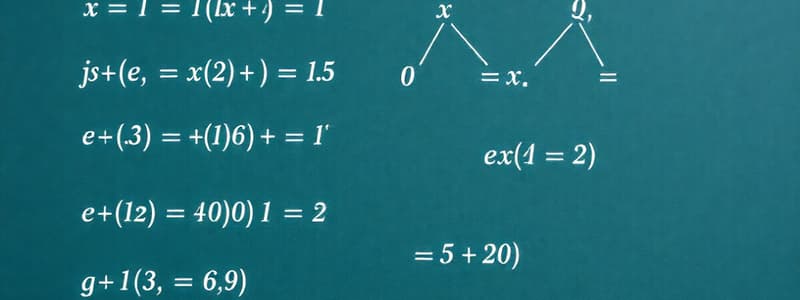Podcast
Questions and Answers
What can be concluded if the discriminant of a quadratic equation is less than 0?
What can be concluded if the discriminant of a quadratic equation is less than 0?
- The roots are real and equal.
- There are no real roots. (correct)
- The roots are irrational and different.
- The roots are rational and unequal.
Which of the following discriminant values would suggest the roots are real, unequal, and rational?
Which of the following discriminant values would suggest the roots are real, unequal, and rational?
- 0
- 9 (correct)
- 4
- -1
For the quadratic equation $3x^{2} + 2x + 1 = 0$, what is the discriminant value?
For the quadratic equation $3x^{2} + 2x + 1 = 0$, what is the discriminant value?
- 8
- 0
- -8 (correct)
- 4
In the equation $x^2 - 6x + 9 = 0$, which characteristics do the roots exhibit?
In the equation $x^2 - 6x + 9 = 0$, which characteristics do the roots exhibit?
If a quadratic equation has a discriminant of 16, which of the following statements is true?
If a quadratic equation has a discriminant of 16, which of the following statements is true?
What is the value of $r_1 + r_2$ if the coefficients of a quadratic equation are $a = 2$, $b = 6$, and $c = 3$?
What is the value of $r_1 + r_2$ if the coefficients of a quadratic equation are $a = 2$, $b = 6$, and $c = 3$?
Given a quadratic equation with roots $r_1$ and $r_2$, which of the following expressions represents the product of the roots?
Given a quadratic equation with roots $r_1$ and $r_2$, which of the following expressions represents the product of the roots?
Which of the following statements about the roots of a quadratic equation is TRUE?
Which of the following statements about the roots of a quadratic equation is TRUE?
How does the product of the roots relate to the coefficients of the quadratic equation $ax^2 + bx + c$?
How does the product of the roots relate to the coefficients of the quadratic equation $ax^2 + bx + c$?
Flashcards
Sum of Roots
Sum of Roots
The sum of the roots of a quadratic equation is equal to the negative of the coefficient of the linear term divided by the coefficient of the quadratic term.
Product of Roots
Product of Roots
The product of the roots of a quadratic equation is equal to the constant term divided by the coefficient of the quadratic term.
Standard Quadratic Equation
Standard Quadratic Equation
In the quadratic equation ax^2 + bx + c = 0, the coefficient of the quadratic term is 'a', the coefficient of the linear term is 'b', and the constant term is 'c'.
Quadratic Equation
Quadratic Equation
Signup and view all the flashcards
Roots of an Equation
Roots of an Equation
Signup and view all the flashcards
Discriminant
Discriminant
Signup and view all the flashcards
Discriminant > 0
Discriminant > 0
Signup and view all the flashcards
Discriminant = 0
Discriminant = 0
Signup and view all the flashcards
Discriminant < 0
Discriminant < 0
Signup and view all the flashcards
What is the formula for the discriminant?
What is the formula for the discriminant?
Signup and view all the flashcards
Study Notes
Quadratic Formula Relationships
- The sum of the roots of a quadratic equation, r1 + r2, is equal to -b/a
- The product of the roots of a quadratic equation, r1 × r2, is equal to c/a
Studying That Suits You
Use AI to generate personalized quizzes and flashcards to suit your learning preferences.




